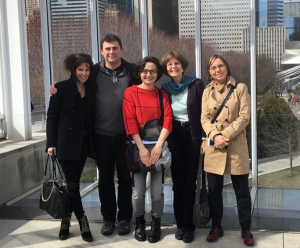by Jennifer Cole and Susan Gal
The conference on March 31st examined the entanglement of gender, nation, sexualities and secularism in Europe, East and West: Why and how have these issues become sharply visible in the last several years, in eastern Europe (as was clear in 1989), and now in the west as well?
Four trends underscore this phenomenon. First, there has been a mobilization of “women’s rights” talk (closely connected to “human rights”) often used to discipline – or promote – religious beliefs and practices. Second, we see the use of homophobic discourse to stigmatize liberal states, politicians and policies. Third, state efforts to manage immigration hinge on attitudes about gender and sexuality. Claims about national religious (Christian) and/or secular heritages of Europe highlight the supposed contrast to attitudes about gender and sex of migrants. Fourth, abortion debates (e.g. in Poland as well as Ireland) reveal tensions between national Christian heritages and a Europe-wide commitment to secularism and liberalism.
These observations raise a number of important issues. For example, what is the role of gendered discourses and practices in enabling, sustaining, and reworking the nature of the secular-liberal state as well as its unexpected transnational alliances? Right-wing think tanks across Europe are mobilizing homophobic, anti-sex discourses and valorizing traditional gender-roles, and they are funded – cross-nationally – by both the Catholic Church and Putin’s Russia. Unexpected “bed-fellows” – one might pun. How and why does the regulation of gender/sexuality and reproduction appear to go hand-in-hand with the disciplining of religion in contemporary Europe? And what might this tell us about the changing ways that nations establish their physical and metaphorical borders/ties to the rest of Europe?
In order to address these questions, the conference brought together some of the major scholars whose work – theoretically, empirically, methodologically – touches upon the central issues at play. The cross-disciplinary discussion featured three keynote speakers from Europe – Sarah Green, Agnieszka Graff and Eric Fassin – chosen to represent issues in West, East and South, drawing from both the humanities and the social sciences, as well as participants from the University of Chicago and other institutions in the US.
For the complete schedule please see the conference website.
In connection with this conference each of the keynote speakers spoke with members of the University of Chicago community how their papers and the work more broadly addresses the issues of nationalism, gender, and sexuality.
Janet Connor interviews Sarah Green:
Kinga Kosmala interviews Agnieszka Graff:
Alexander Shams interviews Éric Fassin

